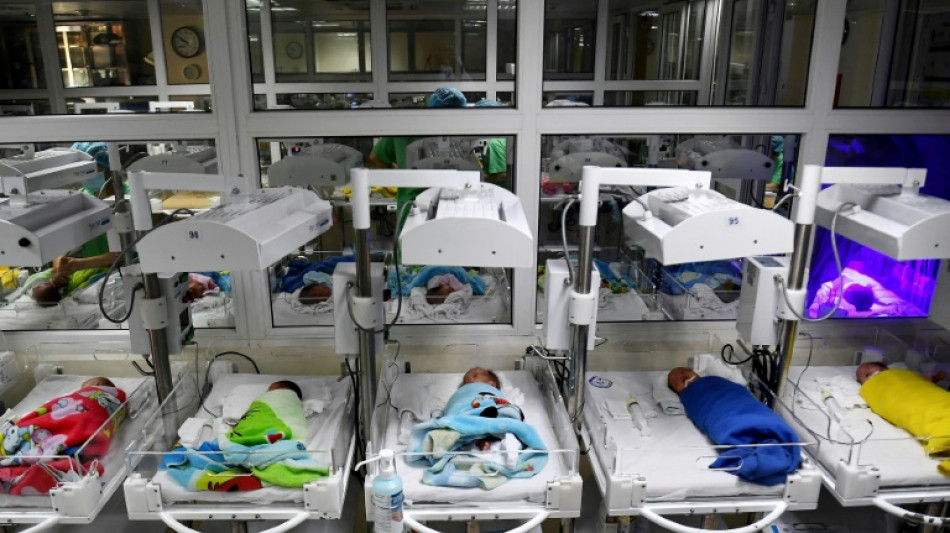
-
 Putin evokes WWII victory to rally Russia behind Ukraine offensive
Putin evokes WWII victory to rally Russia behind Ukraine offensive
-
China exports beat forecasts ahead of US tariff talks

-
 Leo XIV, the 'Latin Yankee', to celebrate first mass as pope
Leo XIV, the 'Latin Yankee', to celebrate first mass as pope
-
Most stocks lifted by hopes for US-China talks after UK deal

-
 IPL suspended indefinitely over India-Pakistan conflict: reports
IPL suspended indefinitely over India-Pakistan conflict: reports
-
German lender Commerzbank's profits jump as it fends off UniCredit

-
 Rare bone-eroding disease ruining lives in Kenya's poorest county
Rare bone-eroding disease ruining lives in Kenya's poorest county
-
India says repulsed fresh Pakistan attacks as de-escalation efforts grow

-
 Zhao's historic snooker title sparks talk of China world domination
Zhao's historic snooker title sparks talk of China world domination
-
'High expectations': EU looks to Merz for boost in tough times

-
 Poisoned guests rarely invited before deadly mushroom lunch, Australia trial hears
Poisoned guests rarely invited before deadly mushroom lunch, Australia trial hears
-
China sales to US slump even as exports beat forecasts

-
 Indian cricket to make 'final decision' on IPL over Pakistan conflict
Indian cricket to make 'final decision' on IPL over Pakistan conflict
-
Dethroned Bundesliga champions Leverkusen face uncertain future

-
 China can play hardball at looming trade talks with US: analysts
China can play hardball at looming trade talks with US: analysts
-
French monuments in trouble while PSG prepare for Champions League final

-
 Newcastle face Chelsea in top five showdown, Alexander-Arnold in spotlight
Newcastle face Chelsea in top five showdown, Alexander-Arnold in spotlight
-
Flick's Barca must show 'hunger' in crunch Liga Clasico

-
 Clasico the last chance saloon for Ancelotti's Real Madrid
Clasico the last chance saloon for Ancelotti's Real Madrid
-
Timberwolves overpower Warriors to level series

-
 Chinese fabric exporters anxious for US trade patch-up
Chinese fabric exporters anxious for US trade patch-up
-
Putin gears up to host world leaders at lavish army parade

-
 Nearing 100, Malaysian ex-PM Mahathir blasts 'old world' Trump
Nearing 100, Malaysian ex-PM Mahathir blasts 'old world' Trump
-
Leo XIV, first US pope, to celebrate first mass as pontiff

-
 Asian stocks lifted by hopes for US-China talks after UK deal
Asian stocks lifted by hopes for US-China talks after UK deal
-
Former head of crypto platform Celsius sentenced 12 years

-
 Ex-model testifies in NY court that Weinstein assaulted her at 16
Ex-model testifies in NY court that Weinstein assaulted her at 16
-
Genflow Biosciences PLC Announces Share Subscription, Director's Dealing and Update

-
 Argo Blockchain PLC Announces 2024 Annual Results and Restoration of Listing
Argo Blockchain PLC Announces 2024 Annual Results and Restoration of Listing
-
'Great honor': world leaders welcome first US pope

-
 Pacquiao to un-retire and fight Barrios for welterweight title: report
Pacquiao to un-retire and fight Barrios for welterweight title: report
-
Trump unveils UK trade deal, first since tariff blitz

-
 Man Utd one step away from Europa League glory despite horror season
Man Utd one step away from Europa League glory despite horror season
-
Jeeno shines on greens to grab LPGA lead at Liberty National

-
 Mitchell fires PGA career-low 61 to grab Truist lead
Mitchell fires PGA career-low 61 to grab Truist lead
-
AI tool uses selfies to predict biological age and cancer survival

-
 Extremely online new pope unafraid to talk politics
Extremely online new pope unafraid to talk politics
-
Postecoglou hits back as Spurs reach Europa League final

-
 Chelsea ease into Conference League final against Betis
Chelsea ease into Conference League final against Betis
-
Pope Leo XIV: Soft-spoken American spent decades amid poor in Peru

-
 First US pope shared articles critical of Trump, Vance
First US pope shared articles critical of Trump, Vance
-
'Inexcusable' - NBA champs Boston in trouble after letting big leads slip

-
 US automakers blast Trump's UK trade deal
US automakers blast Trump's UK trade deal
-
Stocks mostly rise as US-UK unveil trade deal

-
 Trump presses Russia for unconditional 30-day Ukraine ceasefire
Trump presses Russia for unconditional 30-day Ukraine ceasefire
-
Anything but Europa League glory 'means nothing' for Man Utd: Amorim

-
 'Inexcuseable' - NBA champs Boston in trouble after letting big leads slip
'Inexcuseable' - NBA champs Boston in trouble after letting big leads slip
-
Pope Leo 'fell in love with Peru'and ceviche: Peru bishop

-
 Pakistan's T20 cricket league moved to UAE over India conflict
Pakistan's T20 cricket league moved to UAE over India conflict
-
India tells X to block over 8,000 accounts


Applying vaginal fluid to C-section babies boosts neurodevelopment: study
Babies born by cesarean section don't acquire the same healthy bacteria as those delivered vaginally, a setback to the development of their immune system thought to increase their risk of certain diseases later in life.
But a new study, published Thursday in the journal Cell Host & Microbe, finds that applying the mother's vaginal fluids on C-section babies after birth successfully restores this microbial balance, and has neurodevelopment benefits, too.
The study used rigorous methods but was small, involving just 68 infants.
Co-author Jose Clemente of the Icahn School of Medicine at Mount Sinai told AFP that if the findings are confirmed in bigger clinical trials, it could offer a low-cost way to allow C-section newborns to start life on the same footing as vaginally delivered infants.
"If the results can be generalizable to a larger population, then ideally we would like to see that this becomes a part of standard of care," he said.
It comes as C-section rates are on the rise globally, now accounting for around one in every three births in the United States, though the World Health Organization estimates only 10-15 percent are medically necessary.
Past research has shown infants born by C-section have vastly different gut bacteria composition compared to those born vaginally.
The latter receive their early gut bacteria from their mother's birth canal, while C-section babies receive theirs mainly from their mothers' skin, breastmilk and the environment.
These differences tend to disappear by around the age of one, but even so, they can have certain lasting impacts, raising the risk for asthma, allergies and diabetes.
- 'Vaginal seeding' -
In the new study, Clemente, an expert on the role of the microbiome in human health, collaborated with colleagues at the Southern Medical University in Guangzhou, China to test out a technique known as "vaginal seeding," or smearing newborns with vaginal fluid.
Chinese colleagues, led by researcher Yan He, rubbed 32 newborns delivered by C-section with a gauze soaked with their mother's vaginal fluids, and another 36 newborns with a gauze soaked with saline as a control.
The gauze was placed inside the mothers about an hour before C-section. Applying it to babies took about 30 seconds, starting with the mouth and face and moving to the rest of the body.
Mothers were tested in advance to make sure they did not have sexually transmitted diseases and group B streptococcus. No infants experienced severe adverse events as a result of the experiment.
At six weeks old, the group exposed to vaginal fluid had gut bacteria that was more "mature" and more characteristic of vaginally delivered babies than the group given the saline placebo.
The team also looked at the babies' neurodevelopment at three months and six months using a standard questionnaire to ask their mothers about milestones, such as whether the babies were able to make simple sounds or had begun rolling or getting in the crawl position.
The infants who received the vaginal seeding scored significantly higher at both three and six months.
"We think this is partially because of how microbes are producing certain chemical compounds that might impact brain function," said Clemente, an expanding field of study that is backed by animal research.
Crucially, he stressed, the experiment was "triple blinded," meaning nobody involved (mothers, healthcare providers or researchers) knew beforehand which babies belonged to which group, in order to eliminate any temptation to make the results match expectations.
In terms of next steps, Clemente is looking to expand the study with his Chinese collaborators to move the procedure closer to clinical practice, while he has another ongoing study assessing whether it reduces the risk of food allergies.
In the meantime, he says, families should not try to replicate the procedure outside of clinical research settings.
D.Moore--AMWN

